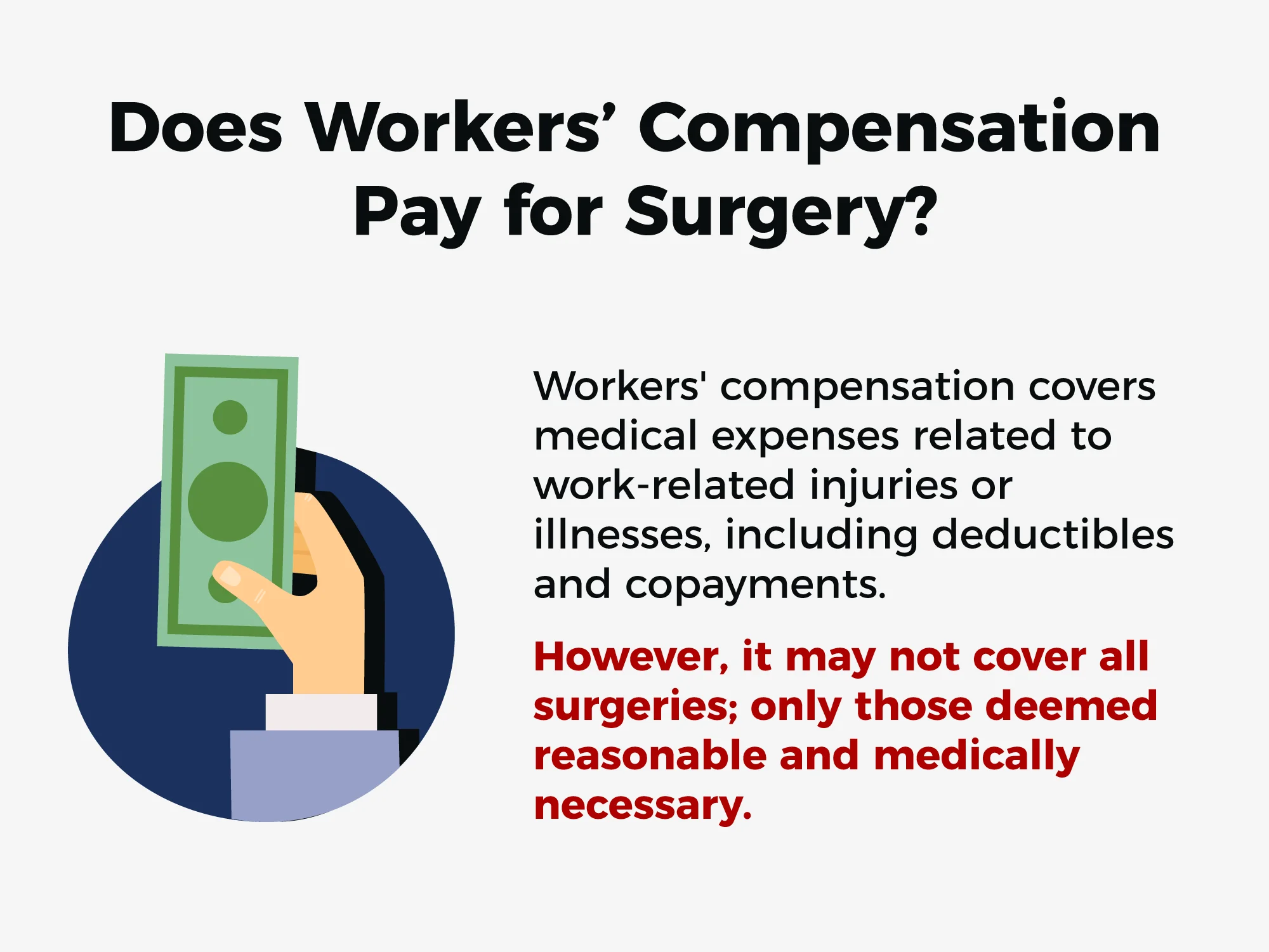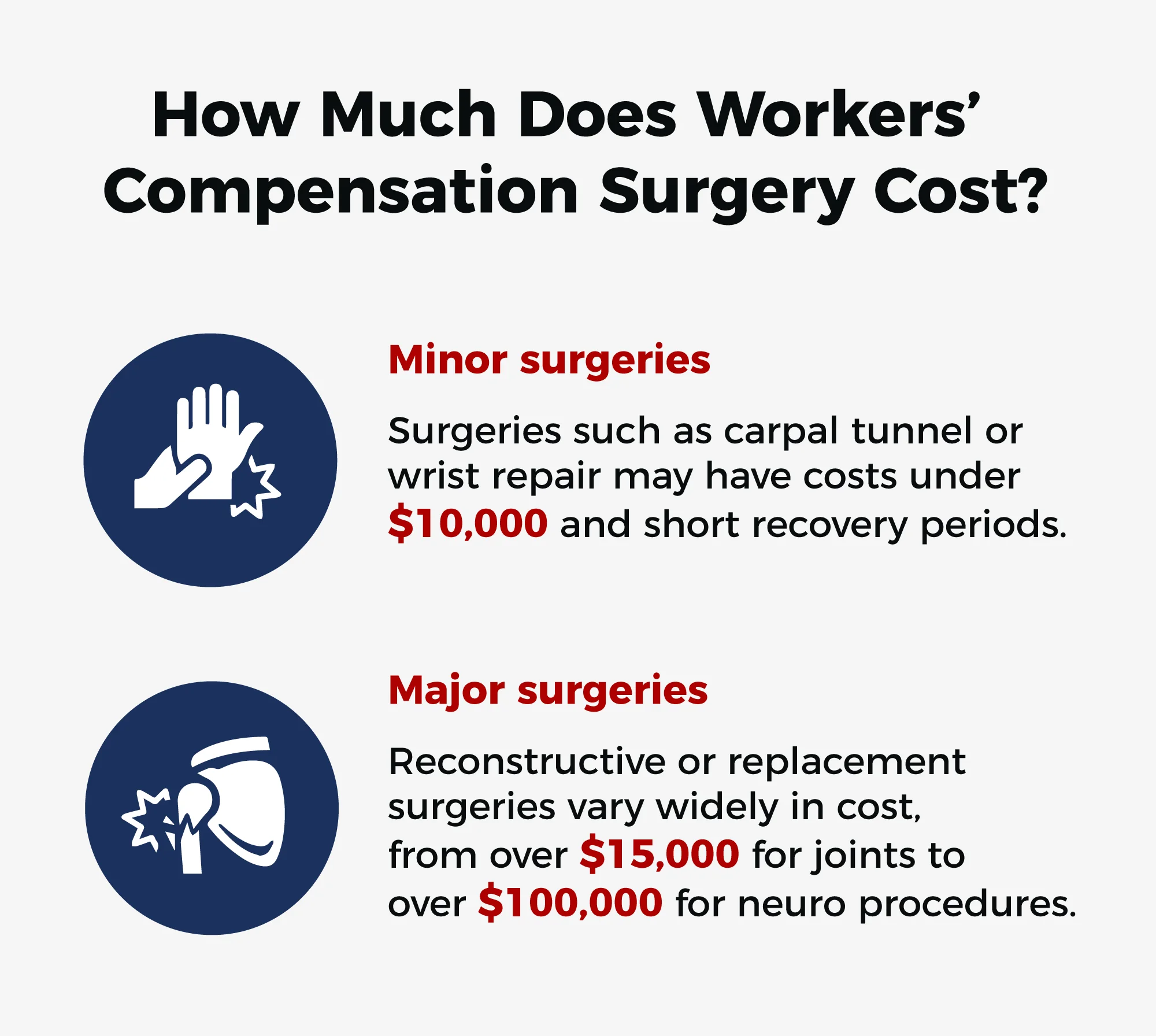Because workers’ compensation is meant to compensate you at least in part for a work-related accident, illness, or medical condition, you would be reasonable to expect that the worse your injury, illness, or condition is, the more workers’ compensation will contribute to your medical expenses today and for future medical benefits.
The need for surgery as part of your treatment for a work injury is no exception to this reasonable expectation. Workers’ compensation will compensate you for reasonably medically necessary surgery costs. So yes, having surgery can often increase the settlement value of your workers’ compensation case.
How much surgery can increase your workers’ comp settlement depends on different factors. Some of these factors you can negotiate, like whether to accept a full and final settlement of your compensation claims. Others you may have little control over––like what kind of surgery you will need.
Helping you understand how surgery costs can affect your overall settlement value, and the advantages and disadvantages of negotiating your settlement before or after your surgery, are two of the ways that a Matt Fendon Legal Group workers’ compensation lawyer can help you to evaluate, negotiate, and settle your job-related injuries and your fair compensation needs. Call us today at (800) 229-3880 to schedule a free consultation for your surgery-related workers’ compensation claim.
Does Workers’ Compensation Pay for Surgery?
As long as your injury, illness, or medical condition is connected to your work, then workers’ compensation should pay for all your related medical bills, including any deductibles or copayment costs.
Workers’ compensation does not pay for all surgeries, only those that are reasonable and medically necessary. This means that in some cases you can encounter resistance from your employer’s workers compensation insurance company about whether to pay for a surgical procedure.
Independent medical examiners might raise any of several objections to paying for your particular surgical claim:
- The insurer can decide your surgery is not medically necessary (such as elective surgery).
- The insurer can decide that the surgery your doctor recommends is not related to the injury you received at work.
- The insurer will first recommend a procedure other than surgery, like physical therapy.
Having a workers’ compensation attorney to represent your interests during settlement negotiations can help you be sure that the insurance company treats you fairly when drafting your workers’ comp settlement agreement.

What Kinds of Surgery Does Workers’ Compensation Pay For?
Now that we know workers’ compensation will cover medically necessary surgery, the next question is, what kinds of surgery are frequently associated with work-related injuries? There are many examples:
- Revision joint replacement surgery.
- Replacement surgery for hips, knees, shoulders, and other joints.
- Prosthetic surgery.
- Spinal fusion surgery.
- Carpal tunnel surgery.
- Anterior Cruciate Ligament (ACL) reconstructive surgery.
- Rotator cuff surgery.
- Burn injury surgery, including plastic surgery.
- Orthopedic surgery for bone fractures and for torn muscles, joints, ligaments, nerves, and tendons. Includes arthroplasty, arthroscopy, debridement, osteotomy, and soft tissue surgery.
- Joint fusion surgery, including bone grafting and related hardware.
- Neurological surgery for injuries to the brain, neck, back, spine, and nervous system. Includes craniotomies, shunts, and spinal tap surgery.
How Much Does Workers’ Compensation Surgery Cost?
How much surgery might cost depends on the severity of the underlying injury and the complexity of the surgical treatment.
Minor surgery, like carpal tunnel surgery or surgery to repair a broken wrist, can be minimally invasive and have a short recovery time. These surgeries might cost less than $10,000.
Major surgery like reconstructive and replacement surgery, is much more expensive to perform and takes more time to recover from. These surgeries can cost from more than $15,000 for a joint replacement to more than $100,000 for some neurological surgeries.
Additional cost considerations of surgery are those connected with preparing for and recovering from the procedure itself. These costs are also compensable by workers’ compensation. Some of these costs include:
- Diagnostic and imaging services, including radiology.
- Costs of inpatient hospital stays.
- Anesthesia costs.
- Medical supplies and equipment used in treatment, including mobility assistive devices.
- Postoperative follow-up treatments, including physical and rehabilitative therapy and chiropractic treatment.
- Costs of prescription medications.
- Home health care services, including skilled nursing services, and modifications to your home and vehicle like stairlifts, ramps, bed lifts, and other necessary changes.

Settling Workers’ Comp Claims Before or After Surgery
The timing of your workers’ compensation settlement, and whether it allows you to reopen your claim, are two factors to consider when negotiating with a workers’ comp insurer. In addition, each option––settling before your surgery takes place, or after––has its own advantages and disadvantages. We examine each of these considerations below.
When Do You Need Surgery?
If you have the option to negotiate with the insurance company before your surgery, this can affect your settlement negotiating strategy.
As we mentioned above about factors that can affect how much your surgery will cost, sometimes, with minor injuries or conditions, you can exercise some control over when to have surgery. Other times, with more serious or life-threatening injuries, medical necessity will dictate your surgery schedule before negotiations begin.
Will You Need Surgery in the Future?
Sometimes the consequences of a work-related injury can require more than one surgery to completely treat. On other occasions, unanticipated complications can arise during your treatment and recovery that can make additional surgery necessary.
If you know that you are likely to need multiple surgeries, this is something to build into your negotiated workers’ compensation settlement.
Advantages of Settling Before Surgery
The advantages of reaching a settlement with the insurance company before you need surgery are mainly those of choice. For example, in a pre-surgery settlement agreement you can choose who your surgeon will be and when to have the surgery.
Another advantage is that if you know you will need surgery, you can factor in the anticipated costs into the settlement agreement.
Also, a well-negotiated settlement agreement can anticipate situations when surgery costs should be borne by a third party, like a different insurer, which can avoid conflicts and possibly increase how much you receive in settlement.
Disadvantages of Settlement Before Surgery
One of the potentially most serious drawbacks of having your surgery before negotiating a workers’ compensation settlement is that you might not only need to pay the costs of surgery up front, but if the insurance company contests the need for the surgery you could be at risk for not receiving any compensation for it.
Another possible downside of a pre-surgery settlement is that it might not adequately account for the possibility that your surgery could lead to complications that can increase treatment costs or affect you in other ways, such as limiting your ability to work.
Advantages of Settling After Surgery
The main advantage of settling your workers’ comp claim after you have your surgery is a higher sense of certainty. You will have a better idea of how much you should be entitled to in compensation for the surgery.
Another possible benefit of delaying settlement until after your surgery takes place is that by doing so you may be able to better estimate when you will reach maximum medical improvement for your injury. This should help you and your workers’ compensation attorney to better estimate what your need for future workers’ compensation benefits will be.
Disadvantages of Settling After Surgery
The main possible downside of settling your claim after you have your surgery is that it could lower the value of your settlement. This can happen for two reasons:
- The more the insurance company pays out in existing costs, the more likely it is to want to lower the value of your settlement overall.
- If your surgery results in improvement in your work-related injury condition, the insurer might use this improvement to claim that you can return to work if you were unable to work before, or if you are working light duty that you can now find work that pays closer to the wages you made before the workplace accident.
Should You Choose a Full and Final Workers’ Comp Settlement?
When you negotiate a settlement of your workers’ compensation claims, you have two choices: a structured settlement and, from 2018, a full and final settlement option. Full and final settlement is a popular choice with workers’ compensation insurers because it helps them to cap settlement costs. It is also popular with many injured workers because full and final settlement deals tend to have higher dollar amounts than a structured settlement plan.
A full and final settlement lump sum payment covers what you can receive in compensation, benefits, penalties, and interest. The challenge of negotiating a full and final settlement is to make sure that it covers all of your possible future medical costs, including future required surgeries and their related postoperative treatments.
- If you choose a structured settlement, then the insurer could be responsible for paying for the cost of future medical care like additional surgery.
- If you choose a full and final release, then it is likely that you will need to pay for the surgical procedure.
If your need for additional surgery comes from a new work-related injury, then you can file a new workers’ compensation claim.
Talk to an Arizona Workers’ Compensation Lawyer Today
What is important to you in getting the best workers’ compensation settlement you can is having a workers’ compensation attorney on your side who truly knows how Arizona’s workers’ compensation laws work and understands how to negotiate with insurance companies who want to keep their settlement payouts down to a minimum.
You can expect a workers’ compensation insurance adjuster and a workers’ compensation lawyer hired by the insurer to know Arizona workers’ comp benefits laws. You can expect these adjusters and lawyers to be tough negotiators to the point where they seem to lack compassion.
Most people do not have the training or experience to deal with these people from a position of strength. This is where you can benefit from having an experienced workers’ comp lawyer on your side to even the odds.
At the Matt Fendon Law Group, our highly skilled and compassionate workers’ compensation lawyers are ready to help you with all aspects of your claim, including your surgical treatment and its payment.
- We will help you understand the nature of your work-related injury, illness, or medical condition and what you will need to treat and recover from it––including medical treatment, surgical procedures, lost wages, and future medical expenses.
- We will represent you in negotiations with your employer and its workers’ comp insurer. We handle all communications with these parties for you, so you need not worry about being outmaneuvered in negotiations.
- If your workplace injury results in you being subject to a temporary or permanent disability after surgery, then you might be able to claim workers comp disability benefits as part of your settlement.
If you need surgery after a work-related accident, we want you to clearly understand that the costs connected with surgery can easily make paying them all crucial to reaching a fair settlement amount with your employer’s insurance company.
The Industrial Commission of Arizona is not obligated under Arizona law to make sure that a full and final settlement agreement is in your best interest before approving it. This makes it vital to get your settlement agreement right the first time. The potential consequences of accepting a low-ball agreement with the insurer, especially if it is a full and final settlement, are too potentially grave to leave to chance.
Call the Matt Fendon Legal Group today at (800) 229-3880 to discuss your surgery needs after an accident on the job and to schedule a free initial consultation with one of our experienced Arizona workers’ comp attorneys.If you prefer, you can also reach us online to communicate with a quality workers’ compensation attorney and to set up a free consultation.
